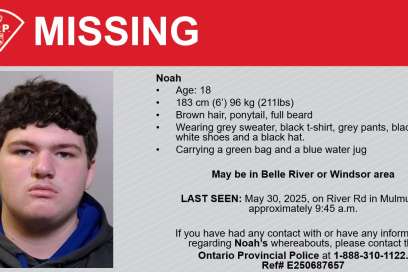Cold Weather Alert Issued For Windsor-Essex
Monday January 20th, 2014, 1:45pm
Hello time traveller!!
This article is 4151 days old.
The information listed below is likely outdated and has been preserved for archival purposes.

The Windsor-Essex County Health Unit has issued a Cold Weather Alert that will be in effect until Saturday.
Based on the Environment Canada forecast, the Health Unit’s Dr. Allen Heimann says the wind chill temperature is predicted to be –27°C tonight. Environment Canada is predicting lows of -15°C throughout the evenings of this week.
The Health Unit says extreme cold is characterized by temperatures far below normal. Individuals who are stranded and those without shelter are in immediate danger, as are individuals whose homes are poorly insulated or without heat.
The most common health problems associated with exposure to extreme cold are hypothermia and frostbite. Hypothermia occurs when the body loses heat faster than it is produced.
- Warning signs of hypothermia in adults include:
- shivering
- exhaustion
- confusion
- memory loss
- slurred speech
- drowsiness
In infants, bright red cold skin, and very low energy are the signs of hypothermia.
Those most at risk of hypothermia are the elderly who don’t have enough food, clothing, or heating, babies sleeping in cold bedrooms, people who are outdoors for long periods (e.g., the homeless), or individuals using alcohol or illicit drugs.
When the skin and underlying tissue freezes, individuals can develop frostbite. Frostbite is characterized by a loss of feeling and colour in that part of the body, most often the nose, ears, cheeks, chin, fingers, or toes.
Warning signs of frostbite include:
- white or grayish-yellow areas on the skin
- numbness
- skin that feels unusually firm or waxy
It is important to seek a warm area and medical care as soon as possible if hypothermia or frostbite is suspected.
Make sure you prepare for cold weather to avoid the dangers of extreme cold. Homes should have a survival kit that contains several days’ worth of crucial supplies, such as food, water, and an alternative source of heat. Ensure that the alternative heat source can be used safely indoors. Cars should also have a survival kit with food and water, as well as a first aid kit and tools to help in the case of an automotive emergency. It is also important for cars to be in good working order before the winter season begins.
While it is best to avoid trips outside during extreme cold, this is not always possible. When outdoors during extreme cold, a number of steps should be taken. The most important thing is to stay warm and dry. Try to cover as much exposed skin as possible. Adults and children should wear a hat, a scarf or mask that covers the face and mouth, sleeves that are snug at the wrists, mittens, a water-resistant coat and boots, and several layers of loose-fitting clothing. Check frequently for signs of hypothermia or frostbite. Cold weather puts extra strain on the heart. People with heart disease or high blood pressure should avoid strenuous outdoor activities. Dressing warmly and working slowly is best.























